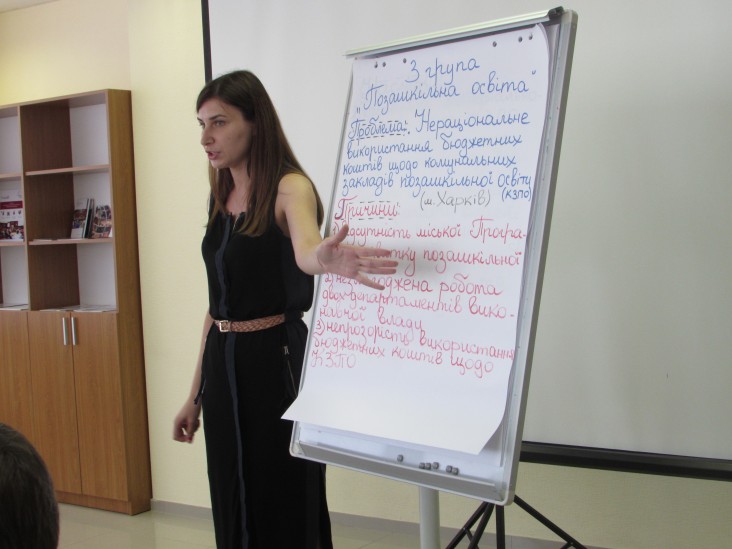
March 2017—Olga Chichina, a young member of the Kharkiv City Council, was looking for ways to do more to fix problems in her community in Ukraine.
When she heard about USAID’s Political Leadership Academy, organized by the International Republican Institute, she applied and was accepted to join a six-day session in 2016. Soon after, she used her academy experience to develop a lobbying campaign to cultivate “out-of-school” educational opportunities for students in her city.
“As a result of my participation in the Political Leadership Academy, I was inspired to reform the out-of-school education system, though I had never worked on this issue before,” says Chichina. “At the Political Leadership Academy workshops, I obtained important tools for implementing my project. I better understood how to make my work as a council member more effective.”
As head of the Kharkiv City Council Commission on Humanitarian Issues, Chichina was familiar with the technical resources available for out-of-school education, including both curricular and extracurricular learning programs held outside the regular daily school environment. But she knew that these tools were extremely outdated.
“When I began to implement my idea, I faced challenges because my colleagues did not understand why I was addressing the issue of out-of-school education. No one had worked on this issue previously or developed ideas for solving it,” says Chichina.
Using her USAID training, Chichina and the Kharkiv City Department of Education analyzed all 94 out-of-school educational institutions and confirmed they were technically obsolete. Chichina then set out to upgrade and reform the system by using one communal enterprise, School of Young Technicians #4, as a pilot project. She began by changing both the name of the institution and its classification.
On July 6, 2016, the Kharkiv City Council agreed to reclassify School of Young Technicians #4 from a communal enterprise to an out-of-school education center, and renamed it “Start.” These changes allowed the institution to provide various out-of-school educational programs in addition to technical education. In addition, funds from the Kharkiv city budget were allocated to upgrade and modernize the school.
Today, teachers from three schools located in the same district have access to the space for conducting extracurricular lessons and activities, which formal school programs previously did not cover. In turn, parents no longer need to pay for additional courses for their children, including courses and workshops on human rights, financial education, and ethics. While the center plans to work with children from all grades, educational programs currently exist for two groups—grades 2 to 4 and grades 5 to 7.
One participating school plans to fund the purchase of technical equipment, such as projectors and screens, for the center. Another school, in cooperation with the local civil society organization, Educamp, won a grant from the British Council to organize additional English lessons for schoolchildren at the Start education center.
“Today, all members of the Kharkiv City Council Commission on Humanitarian Issues are involved in reforming the out-of-school education system, and we are now going to work on this issue in a much more systematic way,” says Chichina.
USAID’s Ukraine Responsive and Accountable Politics Program, which runs from April 2016 through March 2020, promotes political processes that lead to more representative, transparent and accountable governance. The program emphasizes three main areas: promoting political party accountability and inclusivity at the national level, enhancing party and government officials’ representation of citizens’ interests at the local level, and improving the environment for political competition. The program assists a broad spectrum of democratic parties in Ukraine and maintains a geographical balance nationwide. In select regions, the program is designed to help locally elected officials to be responsive to citizens’ interests, and to improve political and leadership skills among youth.
LINKS
Follow @USAIDUkraine, on Facebook







Comment
Make a general inquiry or suggest an improvement.